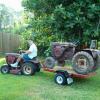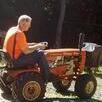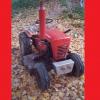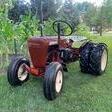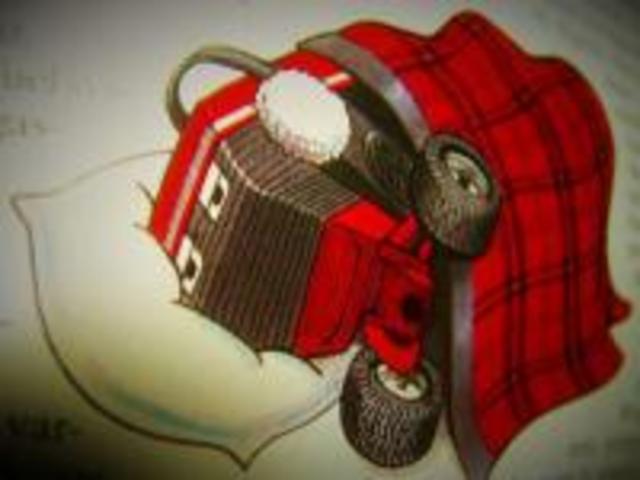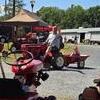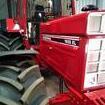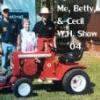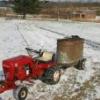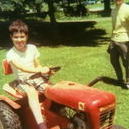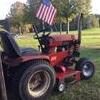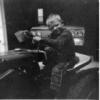Leaderboard
-
in Posts
- All areas
- Markers
- Marker Comments
- Marker Reviews
- Articles
- Article Comments
- Article Reviews
- Classfieds
- Classified Comments
- Classified Reviews
- Wiki's
- Wiki Comments
- Wiki Reviews
- Blog Entries
- Blog Comments
- Images
- Image Comments
- Image Reviews
- Albums
- Album Comments
- Album Reviews
- Files
- File Comments
- File Reviews
- Posts
-
Custom Date
-
All time
November 28 2011 - November 23 2024
-
Year
November 23 2023 - November 23 2024
-
Month
October 23 2024 - November 23 2024
-
Week
November 16 2024 - November 23 2024
-
Today
November 23 2024
-
Custom Date
04/20/2024 - 04/20/2024
-
All time
Popular Content
Showing content with the highest reputation on 04/20/2024 in Posts
-
14 pointsGalloway Farmobile Tractor and much more William Galloway became successful by providing what the customer wanted and making the purchase a pleasure. He learned customer service as a door to door salesman after graduation from collage and working as a traveling sales representative for farm implements. With the lessons learned on the rural roads of Iowa, Galloway began a farm implement dealership in Waterloo Iowa in 1901 and looked for opportunities to meet the needs of his customers. Within a couple of years, he was manufacturing his own line of harrows, carts wagons, and manure spreaders. Soon the product line expanded to include gasoline engines, cream separators, tractors, and other implement specialties. When William Galloway decided to get into the engine business in 1906 he bought an established business, the first Galloway engines were built by a Wisconsin firm, but beginning in 1908 they were built in the Waterloo factory. Galloway built its “Frostfree” line of water-cooled engines in sizes from 1-3/4 to 15 hp along with a 1-3/4 hp air-cooled model. All engines were available as stationary or portable (on wheeled trucks) versions. Prices in 1913 ranged from $29.75 for a 1-3/4 hp air-cooled to $439.50 for a 15 hp portable. (frostfree means the water-cooling tank could be drainer easily) The William Galloway Company had outgrown its manufacturing facility after six years and moved to a new fourteen-acre floor space building in 1907. He was providing employment for over eight hundred people and had sales of two million dollars. Galloway’s sales catalog business provided serious competition to companies such as Sears & Roebuck at that time. The majority of Galloway’s sales were mail order from his catalog with over three hundred thousand customers. Since he had a strong catalog customer base Galloway added household items. The 1913 catalog featured 146-pages of engines, pumps, sawing outfits, manure spreaders, cream separators, portable elevators and well drilling outfits. There were litter carriers, incubators and brooders; sprayers, grain drills and corn planters; plows, harrows and cultivators; harness, saddles and buggies, as well as Galloway wagons, which were famous for their high quality. Also, anvils, forges, iceboxes, mattresses, roofing, work clothes, windmills, and almost anything the farmer could imagine. You could even buy the Little Wonder Vodaphone, tennis rackets, roller skates, and even bicycles through the Galloway catalogs. Since most customers for farm implements traveled to Waterloo Iowa to pick-up their purchases Galloway built a rooming house known as the Galloway Club where customers could eat and sleep for free. Galloway expanded his product line in 1908 to include manufacturing a vehicle promoted as a conveyance that could carry the family to church on Sunday and haul cargo during the week. Power for the rather basic high wheeled car was a two-cylinder, fourteen-horse power engine. One advertisement made a comparison between owning a Galloway Auto Transport to owning a horse , telling prospective customers it was a waste of money to feed horses “… corn worth 75 cents a day and oats worth 35 to 40 cents, and hay worth $14 to $20 a ton …” when they could buy “Galloway’s New Auto Transport,” which “Puts Town Next Door to Your Farm for less than $36 a Year.” The 1910 acquisition of the Maytag-Mason Motor Car Company gave Galloway a much more acceptable car. The Maytag-Mason Automobile was powered by a two-cylinder engine designed by Fred and August Duesenberg. This is the same Maytag that produced gas engines for agricultural machinery and washing machines and the same Duesenberg brothers that went on to produce some of America’s most presages automobiles. Agricultural equipment sales remained strong and were so profitable that it allowed Galloway to make further ventures intro the motor vehicle manufacturing arena. The Dart Truck and Tractor Company was brought into the Galloway family in 1910. These were well engineered machines with chain drive which were update The “Farmobile” tractor was Galloway’s entry into the farm tractor market. The 12-20 model powered by a Dart four-cylinder liquid cooled engine with a two-speed transmission was featured in their catalog for $ 995 and promotion claimed that the Galloway manufactured tractor “Pulls Anything, Anywhere, Anytime.” Having a line of trucks and a tractor to pull the Galloway farm implements made them a full line manufacturer. The October 17, 1918 edition of Automotive Industries noted that “the new worm drive tractors produced three years of experimentation.” The article also states that “…in January of this year the company received an order for 1,080 tractors of this type from the well–known British firm of Henry Garner, Ltd.” The future looked very promising for Galloway with increasing sales of Farmobile Tractors and Dart trucks. A new smaller general purpose Bearcat tractor was being added to the line and the company needed to expand its manufacturing facility to accommodate the growth. Galloway decided to sell corporate bonds to generate funding for the Dart Truck manufacturing facility. Volume 99, Bankers Magazine, 1919, “One of the largest bond issues ever handled by Iowa banks has been underwritten and sold by the Waterloo Clearing House Association without the assistance of either Wall Street or LaSalle Street interests. This was the $1,750,000 issue of the William Galloway Company of Waterloo, Iowa, hearing date of July 1, 1919, and due July 1, 1925. Both are a direct obligation of the William Galloway Company and are a lien against its plant, properties, and business.” The agricultural depression that followed World War Two and the recently generated debt load were insurmountable for Galloway and the firm went out of business in 1921. William Galloway’s sons resurrected the company in late 1926, but on a much more modest scale. As a mail-order company for farm supplies. A 1939 catalog lists cream separators, manure spreaders, harrows, gas engines, feed grinders and hammer mills, wagons, barn equipment, poultry equipment, and paint. No further information was found past 1939.
-
12 pointsPulled the plow off yesterday and stood it up ready to store. Came out this morning and found this!
-
11 pointsI was out of town last week so missed @Pullstart's plow day so the wife and I decided to mow down the winter rye grass today and plow my garden with the 418-8. It was getting a little out of control anyway. IMG_4892.mp4 IMG_9332.mp4
-
9 pointsAnd once done with the removal, the solution is this....... Have these I made on all my Horses - for 10+ years now - remove one retainer clip - push it out with one finger....
-
7 pointsA bigger two jaw, bigger wrench, and one rap with the BFH and she left go. Now that only leaves the spindles stuck in the axle.
-
7 pointsHitch pin removal (hasn't failed me yet): Take the right wheel off and set that side trans on a jack stand...leave the left wheel on. (1) the hitch pin is soft---cut off flush with Sawzall (2) Center punch and drill 1/8" pilot hole in RIGHT side at least 1 inch deep. (3) Open this 1/8 to 1/4 then to 1/2 or more...drilling deeper each time. (4) Using a pneumatic impact hammer with round punch in that hole you drilled to drive it thru. (5) Reinstall pin using a 3/4" with a big "D" ring like this from TSC....less than $10 bux. Coat it with anti-seize.
-
7 points
-
6 points
-
6 points
-
6 points
-
6 pointsNobody had mentioned twisting. As soon as you can get a pipe wrench on the pin, start twisting it with heat and oil/wax and it’ll bust loose much quicker!
-
6 pointsI've removed a couple by sawing off the pin like Dan did, but then I bottom drilled a 7/16 hole in the pin from the right side stopping about 1/4" before drilling thru. Then used a 3/8" drift in the hole and a BFH to drive the pin out. The idea is, you are pulling instead of pushing and mushrooming the end the pin. I can see this combined with Dans puller would really work well. Using the drift in a hole does not mushroom the pin like pounding on the end of the pin.
-
5 pointsThis stupid hitch pin. Every tractor I've ever torn apart this pin is a big issue. It's been soaking in pb blaster since January and I've heated it and no dice. Probably gonna have to drill it. I'm just here to vent.........
-
5 points@PWL216 Has been FAR too kind to me lately. Here we have a 1971 Bronco. Model number 1 0420 6 Interesting coincidence... today's date is this tractor's model number!! Needs pretty standard repairs. Clean-up. New cables. Wiring is a shambles. Good solid bones overall though. And a good bonus, excellent contender for the old ugly seat contest!! Question now... this has the front attach-o-matic. First year? Or PO installation?
-
5 pointsHello All!! Long time no checking in but, THANK YOU ALL for the birthday wishes last month. Appreciate the acknowledgement of the day I was hatched 45 years ago. After finally getting time to be off work early today the opportunity to get the C125 out of it's hibernation since early 83-84. And the story of what exactly happened to it. How I wish Paul Harvey (September 4, 1918 - February 28, 2009) could do this narrative for me. Here is the rest of the story. Bill had two sons, Neil and Patrick. Neil being the oldest was tasked with the lawn work with their father and Patrick being 3 years younger, could help by raking, picking up sticks and trimming with hand shears. One day, the family was heading to Peoria and on the way, passed by the local lawn and garden dealer. Seeing a load of the new black hood tractors outside on display he pulled in and didn't hesitate to purchase a C125, the first Wheel Horse sold at Stoekers Lawn and Garden. Also, his first garden tractor. The tractor was delivered on a Friday afternoon and the salesman demonstrated how to operate it safely to Neil and his father. After taking turns on mowing the lawn, it was parked in the garage. Patrick wanted a turn but his father told him that he can use the push mower for a few years first and then graduate to the rider. Not the answer he wanted. Then came Sunday, the day of relaxing, family picnic and the accident. After church, they all raced home, mother busy with the prep of the drinks, salads and desserts, father cleaning the grill and placing tables in the shade with the help of both sons. That afternoon, people were enjoying their Sunday lunches and conversations when the sound of a motor got the attention of the father. A Wheel Horse had come out of the garage with Patrick driving... poorly at top speed. He managed to strike the concrete flower planter, picnic table with people, dessert table, and a pine tree. Needless to say, tractor was ruined and so was the picnic. I found out that the father had tried to repair/repaint the hood to the best of his ability but couldn't get it the way he wanted. So, instead of selling, or trading it off he decided to bury it in the back of his shed behind the many vending machines to be forgotten until a few months ago. His son Pat is the one who gave me this tractor and told me the entire history of why it was buried. The deal is that I maintain the lawn that tractor was intended for since he didn't get to. I installed a new battery and cleaned the fuel system. That's all! Runs beautiful, drives excellent, needs hood repainted and decals. Needs the Choke handle since it was broken off. Thinking about using plasma cutter and eliminating the discharge chute unless the deck from my 312 will fit. Have to get the C195 out for pictures from small to large
-
5 pointsJust remembered one other thing I do as soon as I get a "new" tractor. I drill a hole down to the pin in the top of each tranny hitch lug. Then fill it with PB and let it sit for a couple years. After I get the pin out, I tap these holes for a grease zerk.
-
5 points@Sarthurs01 and @ClassicTractorProfessor Congratulations guys. You are winners. Please pm me and we’ll get the ball rolling. Thanks again for being here , Richie
-
5 pointsAs long as it does not go above 3,600 RPM you're fine. The little tab that I have pointed out with a blue arrow is your RPM limiter. As the arm, green arrow, swings back and forth, it contacts that tab stopping the upper RPM from increasing. If it is too high, loosen the bolt head and tap the tab counterclockwise just a hair. Recheck. Repeat if necessary.
-
5 pointsGave the Inter the 'ol greasy @peter lena oil rubdown treatment, shined her right up!
-
5 pointsI threw together this puller to remove that last stubborn pin that I had. First I used a Sawzall to cut the pin on each side of the tranny. Then I drilled & tapped the pin that was stuck in the tranny. After that I used this puller to remove the pin. Tighten the bolt on the puller, use a drift to pound on the opposite end of the pin. Repeat, repeat, add more extensions, repeat....
-
5 pointsMy son brought over his 1969 Work Horse 700 and together we showed it done attention. New rear AG’s. New adjustable tie rods and a front end alignment, also replaced the steering thingy that bolts to each frame rail (can’t think of the name). That part was a PIA!! He also brought over the 42” deck off his 314-8 so we could use my air gun to get his mowing blades swapped. Great day!
-
4 pointsAny Wheel Horse fans in Tacoma, WA? I need to re-home this little guy... Looks to me like a 1960s Wheel Horse REO ride on lawn mower that's missing the mower deck. Does not run.
-
4 points
-
4 points
-
4 points
-
4 pointsI’m not a farmer nor will I ever plow a garden. Wheel Horse 12” bottom plow with coulter and height roller. Missing the height adjuster. *** SOLD TO JPWH ***
-
4 pointsIf the pin won't come out easily I don't even fight with it. Three cuts and move on to the press. Cut both ends off flush with the transaxle to remove the slot hitch/draw bar, cut at the center of the transaxle castings and after the transaxle has been pulled apart take both halves to the press and push the remainder of the pin out of each half.
-
4 pointsI’m not sure when they switched back to a steel fender pan for the black hoods, but some of the literature shows plastic and some shows steel.
-
3 points
-
3 points
-
3 points
-
3 points
-
3 points
-
3 points
-
3 pointsI have wanted to make this post for the past ten months; today I drove a Wheel Horse for the first time since my stroke! My wife was a bit apprehensive about the whole thing and I wasn't even sure I could get on the 310-8; but I did and it felt SOOOOOO GOOOOOOD
-
2 pointsI figured you'd like this one. But ya know.... the whole setup is different from the 1970 I had. The axle mount and everything would have been changed. Maybe this one's been frame swapped?? I'm hoping that works but we have several setups for a manual clutch anyhooo. Me too but they're pretty cracked up. Might be usable with tubes??
-
2 pointsI was maybe 10 when a well-to-do neighbor bought a spiffy new Cub Cadet. I was never allowed by my parents to drive it but I’m sure that that experience planted a seed for me. Eventually my dad converted a Crosley car into a tractor for our large household garden. It was a temperamental thing, for sure, but eventually i was allowed to drive it. What a blast.
-
2 points1969 WHs had the first generation Mule Drive. They were not around long. I would imagine by 1971 current version was in use.
-
2 pointsAdded emphasis. Stuff works great, but pleas read the usage warnings on the label.
-
2 points
-
2 pointsThat was the point where I ran out of room inside the pipe coupler. Those are 3/4" washers over the pin.
-
2 points
-
2 pointsTractor supply hitch pins, pull out the handle, cut to length, drill hole for supplied hairpin, done.
-
2 pointsThe bar that goes across the bottom of the flip fenders that the latch catches has a tendency to wear away, break or ends up missing.
-
2 points
-
2 pointsThose air hammers have helped me once or twice. Yes cut the slot hitch and take the hitch to the press if needed. Gets the draw bar out of the way too.
-
2 pointsYer not doing something right or missing hardware Wheeler. Mine flip up all the time but I am too stupid to latch it (early style). Anyone got a pic of the late style for him?
-
2 pointsHappy to see that Picture. Best evidence for yourself you recover ❤️👍
-
2 points
-
2 pointsHave been busy the last couple of weeks. The Inter is running well until it did'nt.. fuel issue.. the tank was al plugged up with dirt and debris. I unclogged it and installed a see though pre-filter along with new fuelfilters. Runs much better now. Still have to properly clean the tank though. Also carried out maintenance on the entire machine, changed all the fluids and filters minus coolant. Also fixed both leaky PTO seals. Bearings are excellent, shafts do have some minimal wear but nothing a new shaft seal won't fix. Now no more leakage detected. After that it was time for the first 'real' test.. cleaning up years of accumulated dirt, grass, weeds and what not to uncover the concrete slabs that were hidden underneath. I thoroughly enjoyed this little job and the tractor did excellent. I'm kinda getting why all you guys are always going on about 'seat time'

